#andromache of troy
Text

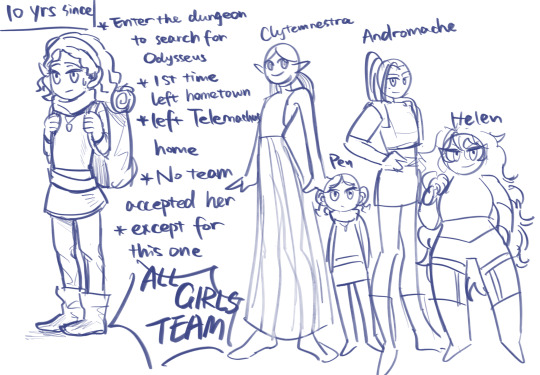

Yes this is those greeks in Dungeon Meshi AU, another my headcanon hahahahhaha (I'm really into this ahhhhh). So this is basically a story that Odysseus joined a team to venture in the dungeon. As he never come back, Penelope decided to find things out on herself ( with companion, of course.)
( I find rookie venturers Elf!Pen and Tallman!Ody met each other in a new team is also very fascinating)
(So does another possibility: Penny took Tele with her and obviously no one would take them in, except for the girls. but this is a bit errr so I passed it Ahhhhhh)
( And don't worry Penny left Telemachus with her father and mather-in-law)
#epic the musical#the odyssey#the illiad#greek mythology#Penelope#Odysseus#Odypen#agamemnon#Menelaus#Achilles#patroclus#patrochilles#clytemnestra#andromache of troy#helen of sparta
30 notes
·
View notes
Text
IMAGINE being Andromache and your DAD and seven BROTHERS were killed by a blond twink and your HUSBAND gets also killed by said twink bc he killed the twink's bf
#iliad meme#the iliad#paris iliad#hector iliad#andromache of troy#the song of achilles#achilles#patroclus
22 notes
·
View notes
Text
Grabs you by the arms
Did you know? Did you know Hector, with his handsome face and brow clutched his son? Did you know that he removed his great helm to press kisses to the boys crown? Did you know Hector told his lovely Andromache, go to your handmaidens and do your weaving, leave all men to their fate at the call of the war, me especially? Did you know she mourned him as he walked the great streets of troy for his fate was sung long ago, to die for the city he so loved? Did you know he gazed into the eyes of his foe, godlike Achilles, and asked only for his body to be returned to his high father Priam to be buried? Did you know he faced the best of the Greeks bravely even when he swore his skin would serve as feed for his dogs? Did you?? Did yo-
#hector of troy#andromache of troy#the iliad#greek myth#achilles#scamandrius#astyanax#tagamemnon#I’m doing a Greek lit class for my classics minor rn#as you can see#it’s driving me a bit insane#god I fucking love Hector
410 notes
·
View notes
Text
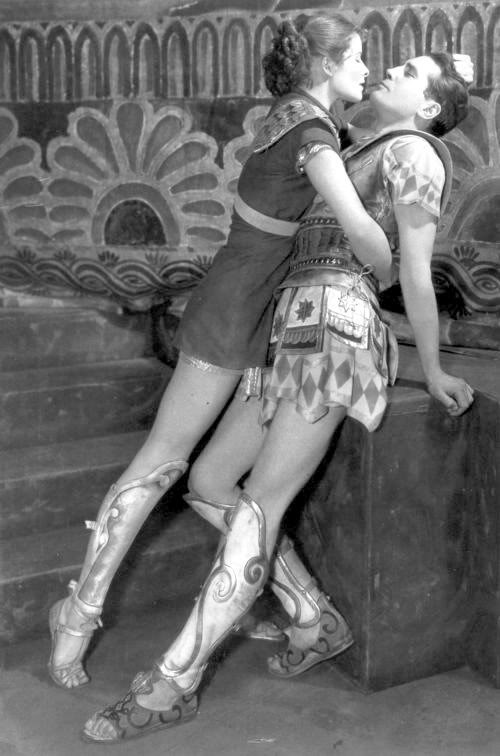
This is so Andromache/Hector omg my fellow Iliad artists we know what to do
4K notes
·
View notes
Text

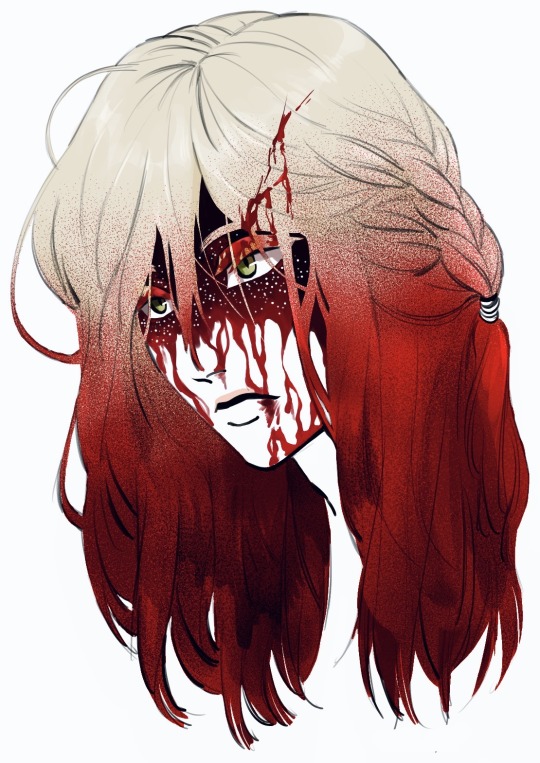
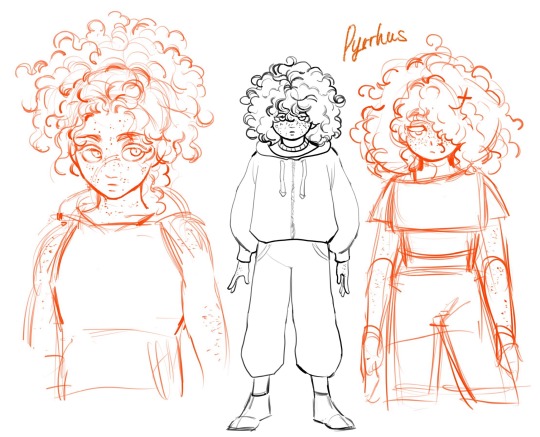
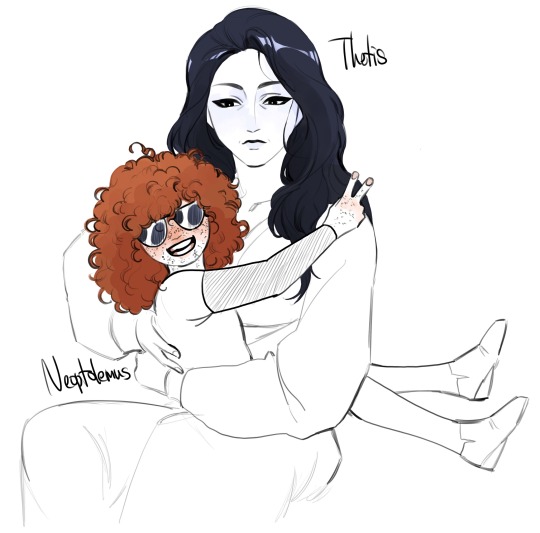
I’ve been wanting to draw modern au greek mythology for a while, so I kind of gave it a shot!
#greek mythology#the iliad#hector and andromache#hector of troy#achilles#neoptolemus#pyrrhus#thetis#pickled achilles#andromache of troy#hector
219 notes
·
View notes
Text
youtube
drink with me
#art#animatic#the iliad#greek mythology#hector of troy#paris of troy#agamemnon#menelaus#ajax the greater#ajax the lesser#teucer#odysseus#diomedes#nestor#achilles#patroclus#andromache of troy#astyanax#penelope#telemachus#these designs arent final but its all i got#Youtube
983 notes
·
View notes
Text
Hector of Troy…
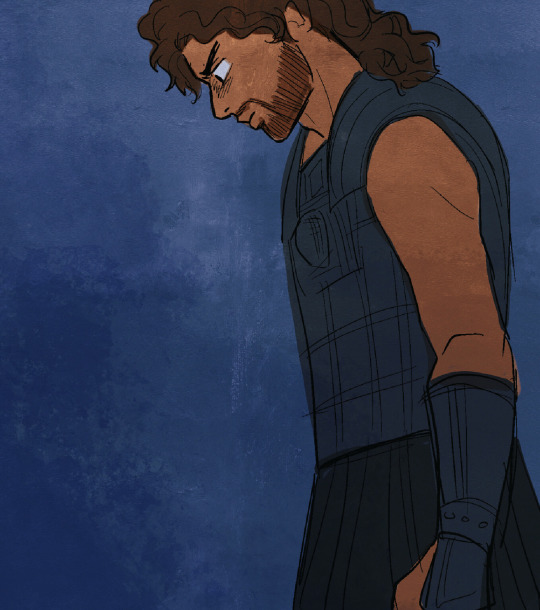
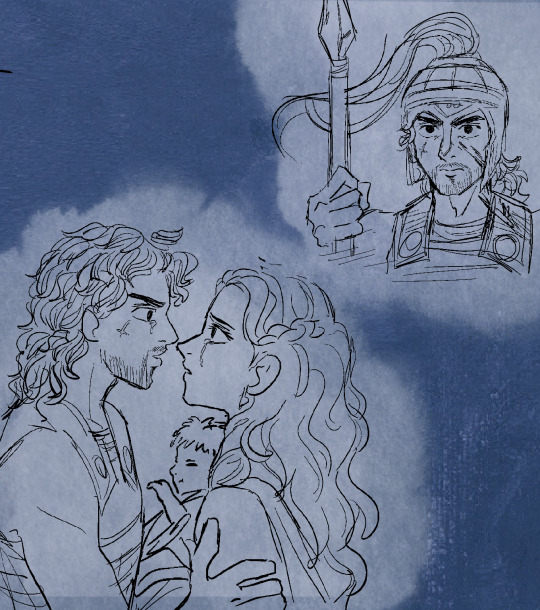
Im rereading the Iliad so I drew my buddy Hector. HE DESERVED BETTER, FOREVER A HECTOR APOLOGIST
@kebriones thank you for awakening my Hector obsession
#the iliad#epic the musical#greek mythology#character art#tagamemnon#greek myth art#fanart#oc art#greek gods#character design#hector of troy#homer's iliad#the odyssey#hector and andromache#andromache of troy#astyanax#song of achilles
124 notes
·
View notes
Text
"In a famous scene in Book 6 of 'The Iliad,' Andromache, accompanied by her baby son and enslaved nurse, begs her husband, the great Trojan warrior Hector, to adopt a less dangerous military strategy, rather than face the enemy on the open plain. He refuses, and they part for the last time. In the original Greek, the wife and husband each use the same word to address one another: 'daimonios.' The word is cognate with 'daimōn' — 'spirit' or 'deity' (from which we get the English 'demon') — and presumably suggests, in its most literal sense, that a person is influenced by some superhuman power. Yet it is surprisingly common in Homer, generally used when one individual addresses another. It is sometimes taken to suggest little more than 'Sir' or 'Ma’am'; sometimes the context suggests it is negative ('possessed' or 'crazy'), sometimes the opposite ('You marvelous person!').
Many translators of this scene use different renditions of the word in the two instances. In Lattimore, Andromache calls Hector 'Dearest,' while he calls her 'Poor Andromache!'; in Fagles, Andromache calls Hector 'Reckless one,' while Hector calls Andromache 'Dear one'; in Fitzgerald, Andromache uses 'Wild one,' and Hector uses 'Unquiet soul' (a lovely phrase lifted from Shakespeare’s 'Merchant of Venice' — although oral poetry does not abound in clever literary quotations). I felt it was important to use the same word for both the wife addressing the husband, and the husband addressing the wife, to echo the symmetry suggested in the original, and I used 'strange' in both instances ('strange man … strange woman,' echoing the different genders of the original). I hoped that this word might hint at the Greek term’s suggestion of something unusual, perhaps divine or inhuman. This heartbreaking scene evokes both deep intimacy and profound estrangement between husband and wife, one of whom will soon be dead and the other enslaved."
- Emily Wilson, from "Emily Wilson on 5 crucial decisions she made in her ‘Iliad’ translation." Washington Post, 20 September 2023.
#i'm so intrigued by this new iliad translation that just came out!#emily wilson#quote#quotations#homer#the iliad#hector of troy#andromache of troy#hector and andromache#ancient greek language#classics
182 notes
·
View notes
Text
Georges-Antoine Rochegrosse, Andrómaca
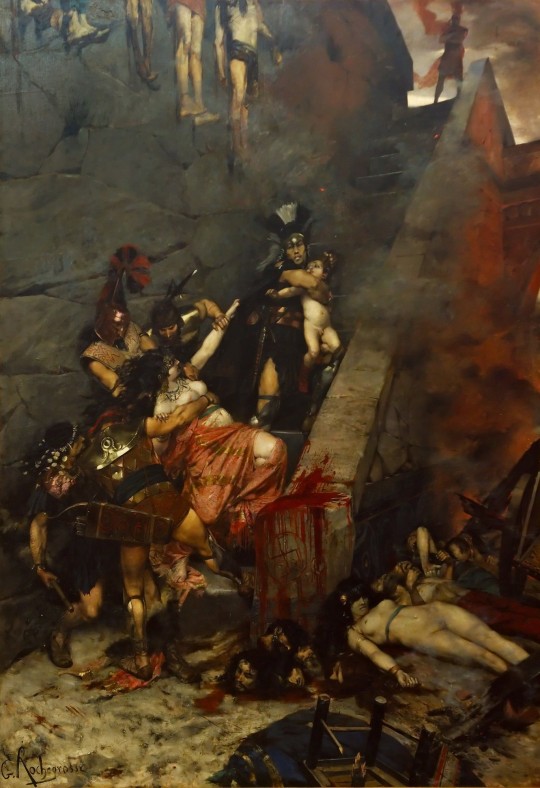


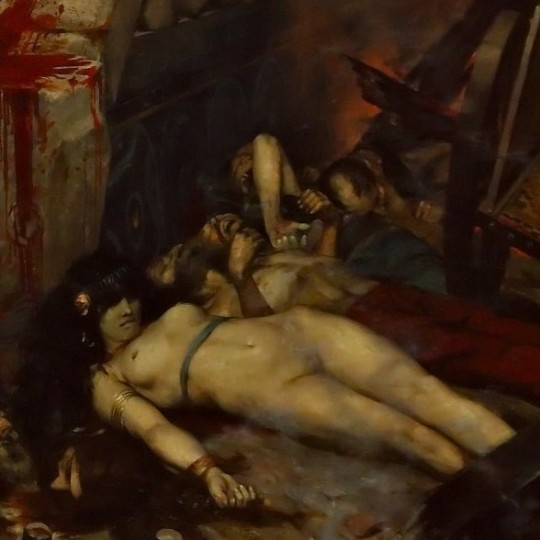
#classic art#traditional art#traditional painting#classical art#art history#oil painting#art detail#art#19th century art#art details#arte#artwork#oil paintings#oil on canvas#fine art#andromache of troy#georges antoine rochegrosse
114 notes
·
View notes
Text
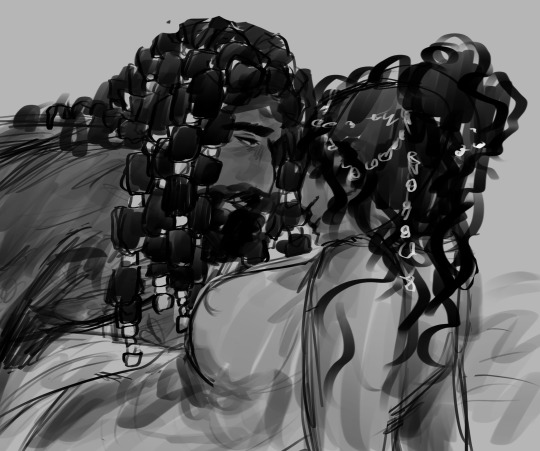
Hello everyone… Goodnight everyone!
I’m obsessed with Hector and Andromache being happy and alive and in love.
#this was not meant to be as suggestive as it is#oh well#the illiad#hector of troy#andromache of troy#hector and andromache#greek mythology#classics#hector#andromache#art
309 notes
·
View notes
Text
As much as I like the scene with Achilles and Priam; I kinda wish Andromache was the one to talk with Achilles instead of him
Because think about the parallels between Achilles and Andromache!
Like like
After both Hector and Patroclus died they probably were the only people that could truly understand what the other was feeling
And imagine how would it be for Andromache to have to go and confront the killer of her husband just to realize that they're more alike than what they might think
#ramblings#greek mythology#iliad#trojan war#tagamemnon#achilles#patroclus#patrochilles#hector of troy#andromache of troy#hector and andromache#I need someone to write a fanfiction where Achilles and Patroclus change places with Andromache and Hector#mostly because I want to see wife Achilles and warrior Andromache#sometimes the enemy is a reflection of the self
49 notes
·
View notes
Text
Hector, sweating: Andromache, there’s something I need to ask you-
Andromache: Finally! You’re proposing!
Hector: How’d you know?
Andromache: Hector, you’ve dropped the ring five times during dinner.
Andromache: I even picked it up once.
58 notes
·
View notes
Text
A (not exhaustive) inventory of Astyanax's death and survival.
In the Little Iliad, Neoptolemos is the killer.
In the Iliou Persis, Odysseus is the killer.
In the Trojan Women we don't actually know who does the deed, "merely" that Odysseus is singled out as the (major) voice who argued for his death. As Andrew Erskine in Troy Between Greece and Rome points out (referencing another academic as well), given the lack of detail in what's left to us, Odysseus might well have been involved in Astyanax's death in the Little Iliad as well, in the same role he has in here in the Trojan Women.
Seneca (Troades) follows Euripides in the public deliberation and has Odysseus being present for Astyanax's death, but he has Astyanax leap voluntarily. (Excuse me, WTF.)
Quintus of Smyrna, in his Posthomerica, has the killing be done by "the Greeks". Not just the deliberation like in the Trojan Women, but "they" seized him and tossed him from the wall. Whether intended or not, it makes it read a little like a mob scene. (edited to add this, because I'd forgotten to check.)
Tryphiodoros, in the Taking of Ilios, has it again be Odysseus.
So what we get is that even when Odysseus isn't actively the hand that commits the deed, he's the (first? major? leading?) voice in claiming it "needs" to be done. For the ~safety of Greece~, of course.
So, now we come to myths and stories of Astyanax's survival. It's mostly here the "not exhaustive" disclaimer applies. For a lot of the Medieval sources (where this idea flourishes) I can't double check if they say anything about who/how Astyanax survives.
With that said; the Medieval manuscripts aren't the earliest ideas of Astyanax's survival!
One is late Classical or earlier; Dionysios of Halikarnassos reports of the Ilians (that is, the Anatolian Greeks of the "modern" Ilion/Troy, built somewhere after ~1000 BC) had a founding legend that involved Astyanax and Askanios.
Given that Astyanax can approach his cousin after being released by Neoptolemos, presumably Neoptolemos didn't kill Astyanax but rather take him along into slavery with his mother and Helenos.
I'll just include this screencap from Troy Between Greece and Rome for the next bit since it's easier:
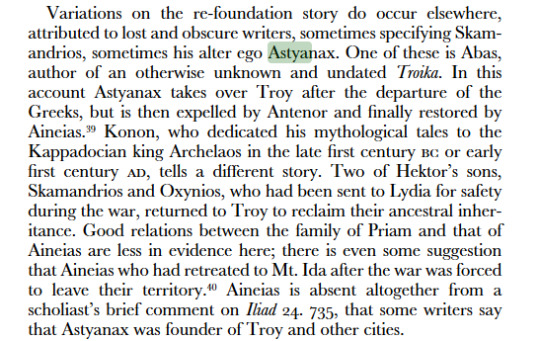
On to the Medieval sources; the absolute earliest appearances of Astyanax here is as the founder of the Franks, now named Francion/Francus. French Wikipedia has a note to an author that says that Astyanax's survival was effected by (unnamed in the text and note) Medieval authors by the Greeks softening up and ending up not killing Asyanax because of his beauty.
Next is the "Andromache swaps Astyanax for another child and the Greeks (more like Odysseus) is tricked and kills the substitute". It has several appearances/uses, but the earliest (at least by the list in Wikipedia) seems to be Boiardo's Orlando Innamorato (1495).
While being unable to, like, check if anyone is named as the rescuer in some of these (Wiki also has an unsourced mention of Talthybios), in general we seem to land on either Neoptolemos or, in later stories, Andromache herself. I wouldn't think Neoptolemos ends up not killing Astyanax out of the goodness of his heart, more as a way to control Andromache, but there it is either way.
Odysseus is only ever an obstacle to be worked around, which isn't odd given how often he is either the killer, or, maybe far more important, the voice to argue that Astyanax need to die. Not so odd he'd then be construed in later stories as the character to be specifically tricked by the child-swap.
I'll put the sources under the cut!
(For the Little Iliad)
Scholiast on Lycophr. Alex., 1268:
"Then the bright son of bold Achilles led the wife of Hector to the hollow ships; but her son he snatched from the bosom of his rich-haired nurse and seized him by the foot and cast him from a tower. So when he had fallen bloody death and hard fate seized on Astyanax. And Neoptolemus chose out Andromache, Hector's well-girded wife, and the chiefs of all the Achaeans gave her to him to hold requiting him with a welcome prize. And he put Aeneas, the famous son of horse-taming Anchises, on board his sea-faring ships, a prize surpassing those of all the Danaans."
(For the Sack of Ilion/Ilioupersis)
The Greeks, after burning the city, sacrifice Polyxena at the tomb of Achilles: Odysseus murders Astyanax; Neoptolemus takes Andromache as his prize, and the remaining spoils are divided.
(Note 136 to Apllodorus' Library, trans. Frazer)
Compare Arctinus, Ilii Persis, summarized by Proclus, in Epicorum Graecorum Fragmenta, ed. G. Kinkel, p. 50; Eur. Tro. 719-739, Eur. Tro. 1133-1135; Eur. And. 8-11; Paus. 10.26.9; Quintus Smyrnaeus, Posthomerica xiii.251-257; Tryphiodorus, Excidium Ilii 644-646; Tzetzes, Scholiast on Lycophron 1263; Scholiast on Eur. Andr. 10; Ov. Met. 13.415-417; Hyginus, Fab. 109; Seneca, Troades 524ff., 1063ff. While ancient writers generally agree that Astyanax was killed by being thrown from a tower at or after the sack of Troy, they differ as to the agent of his death. Arctinus, as reported by Proclus, says merely that he was killed by Ulysses. Tryphiodorus reports that he was hurled by Ulysses from a high tower. On the other hand, Lesches in the Little Iliad said that it was Neoptolemus who snatched Astyanax from his mother's lap and cast him down from the battlements (Tzetzes and Paus. 10.26.9). According to Euripides and Seneca, the murder of the child was not perpetrated in hot blood during the sack of Troy but was deliberately executed after the capture of the city in pursuance of a decree passed by the Greeks in a regular assembly. This seems to have been the version followed by Apollodorus, who apparently regarded the death of Astyanax as a sacrifice, like the slaughter of Polyxena on the grave of Achilles. But the killing of Astyanax was not thus viewed by our other ancient authorities, unless we except Seneca, who describes how Astyanax leaped voluntarily from the wall while Ulysses was reciting the words of the soothsayer Calchas and invoking the cruel gods to attend the rite.
(Trojan Women, Euripides)
Talthybius
You that once were the wife of Hector, bravest of the Phrygians, [710] do not hate me, for I am not a willing messenger. The Danaids and sons of Pelops both command—
Andromache
What is it? your prelude bodes evil news.
[…]
Talthybius
They mean to slay your son; there is my hateful message to you.
Andromache
[720] Oh me! this is worse tidings than my forced marriage.
Talthybius
So spoke Odysseus to the assembled Hellenes, and his word prevails.
Andromache
Oh, once again alas! there is no measure in the woes I bear.
Talthybius
He said they should not rear so brave a father's son.
(Dionysios of Halikarnassos; Ant. Rom. 1. 47. 5–6)
Aineias . . . sent Askanios, the eldest of his sons, with some of the allies, mainly Phrygians, to the land called Daskylitis, where the Askanian lake is, since his son had been invited by the inhabitants to rule over them. Askanios did not dwell there for long. When Skamandrios and the other descendants of Hektor approached him after Neoptolemos had released them from Greece, he went to Troy and restored them to their ancestral kingdom.
52 notes
·
View notes
Text
Whenever I think about the meaning of Astyanax's name, I get a little sad
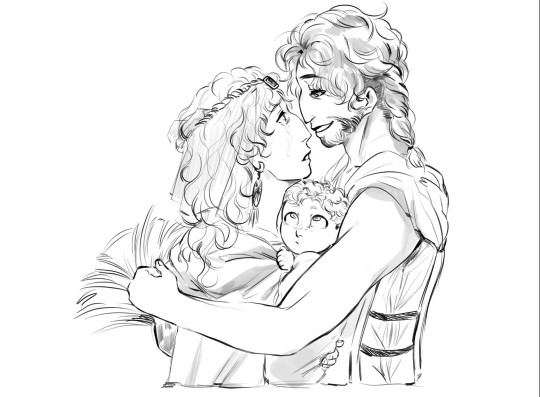

#hector#hector of troy#andromache of troy#odysseus#hector and andromache#greek mythology#trojan war#the iliad#goat king Odysseus
413 notes
·
View notes
Text
I need an Andromache retelling where she kills Neoptolemus.
#greek mythology#andromache of troy#Andromache#hector#hector of troy#neoptolemus#priam#astyanax#the iliad#little Iliad#euripides
78 notes
·
View notes
Text
Iliad, book XXIV.
What if the gods had never sent Hermes to Priam to accompany him to the Achaean camp? What if he never went there in the end?
What if it was Andromache, who, alone, sneaked out of Troy and into the Myrdmidon camp to find a way to bring her husband's body home?
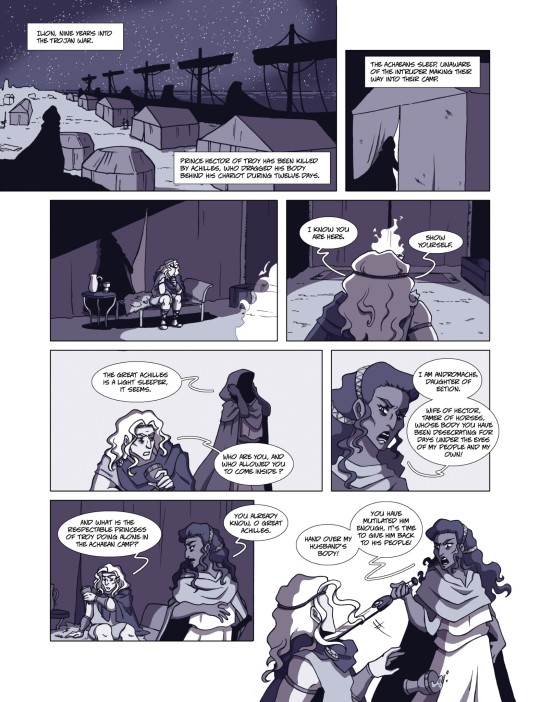
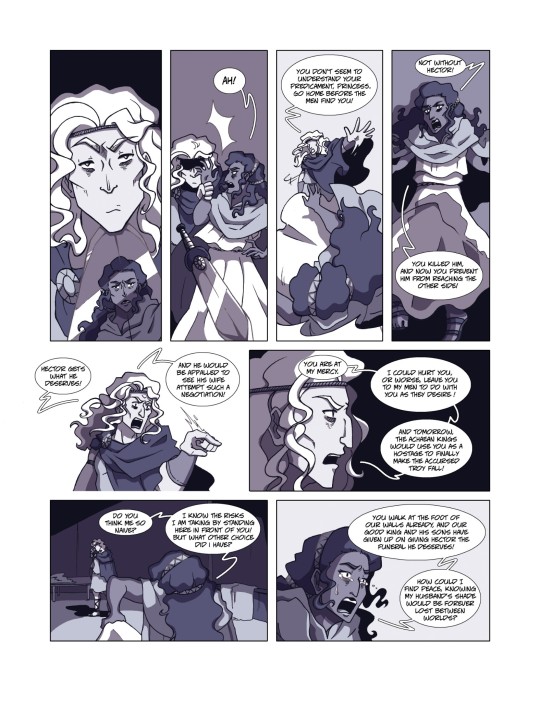
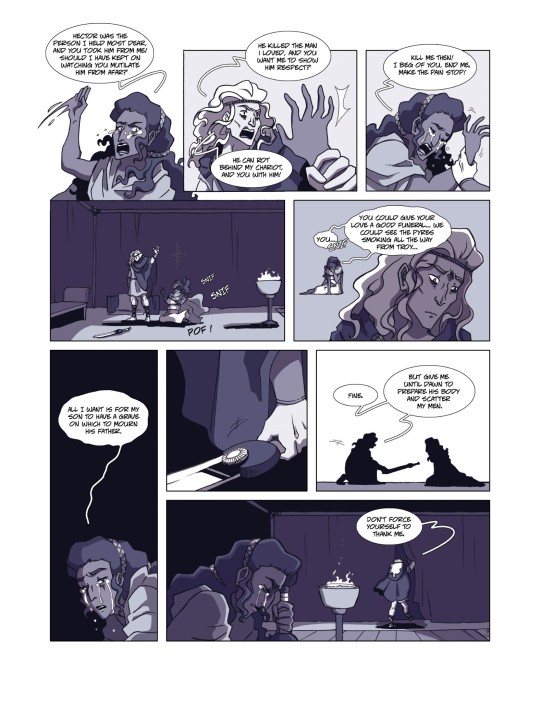
This is a class assignment that I chose to do on the Iliad because I am still obsessed. The speech bubbles might look a bit weird because I originally did this whole comic in French and then translated it. Hope you guys like it because I cried a lot internally writing this.
#sol art#my art#comic#the iliad#tagamemnon#the trojan war#achilles#andromache#andromache of troy#yeah the assignment was basically to make an au of an already existing scene#don't mind the mistakes English isn't my first language honhon baguette#that one panel with Achilles with Andromache's blade on his throat is my favourite#he looks like the cat from the meme with a knife pointed at.
215 notes
·
View notes